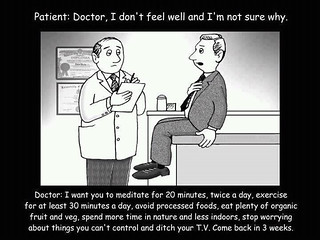| English: Glenkens Medical Practice Rural medical practice serving the Glenkens area. (Photo credit: Wikipedia) |
Job Burnout and the Medical Assistant: Coping Skills
What exactly is job burnout?
Job burnout is simply depression that is job related. You
dread going into work. You feel if your job has little meaning, and it can affect
your job performance and attitude towards your patience. You may even consider
quitting your job, or because of depression related fatigue makes mistakes.
Those around you will notice that you are not quite yourself .and You will have
a low opinion of your own job performance and the practice overall. Job burn
out if not dealt with can cause you to leave your job unnecessarily or be
terminated.
The Stages of Job Burnout
Medical Assistants, who suffer job burnout, usually are the
one’s who start out most enthusiastically. They are perfectionist who quickly
becomes know as the reliable one.
Falling to far in Love with Your Work
The first stage of burnout actually in the infatuation
period in which the medical assistant new to a practice lives eats and sleeps
work. These medical assistant spend their down time thinking about or even
staying at the practice thinking about what they can do improve their
performance and move up the employment ladder. They do not know how to say no
to fellow employees or the doctor. They have unrealistic expectations of
themselves and others. This leads them to be put upon and then chastised by staff
that has come to depend on them when they burn out.
How to avoid this
It is great to love your job. Yet, even the most
enthusiastic medical assistant must achieve a life balance. Don’t take work
home with you. Mentally visualize yourself shedding your job self and putting
on your home self when you leave for the day. Don’t stay in your scrubs and
jump on the computer to find the latest article on effective electronic prescription
management.
If you are continuing your education to get a promotion at
work, view that as more of a personal activity than a professional one. Use
your medical assisting experience to do papers and the like, but don’t
intentionally seek out experiences at work to enhance your study experience
unless you are doing an internship or externship.
Work Harder to Keep Your Job Infatuation
If you have not nipped your job infatuation in the bud then
you will move to the next stage. This is the stage where you are still trying
to have all your emotional needs meet by your job performance. You have already
set yourself unrealistic job standards and have not set boundaries with your
coworkers. They now are aggravated when you do not step in to edit their
documents, fill in when they want a day off, or order lunch for the office. None
of these things were part of the job description. Everyone loves you at the
office and this feeds your ego, but at what cost.
How to prevent this
Yes there are times when the medical assistant must go above
and beyond their job description but apply the rules of common sense when you
do. If you take someone else’s hours because they have a sick child at home, it
is reasonable that on a day you have an early appointment they will fill in for
you. If favors that you do on an individual level for co-workers are not
repaid, there is a good chance that you do not have proper boundaries. Set
boundaries when you do things outside the scope of your job description.
Now this can be difficult when dealing with the doctor or
practice manager. If you are up to the task and performing to the task does not
affect your ability to meet your job deception, then by all means accept the responsibility.
If you are not politely tell the person even if they are your superiors why you
can not. Tell them you are catching up on important expected work or that you
do not feel you are the best person in the practice to perform that particular
task. Doctors many times have little understanding your role outside of the
exam room. They do not know which medical assistant is best at finding that odd
medical supply. The doctor will appreciate being directed to the right person
for the task even if it is not you.
The third stage of burnout is dissatisfaction with your job
and negative coping. This can mean serious problems for some medical
assistants. It can lead to those with past issues of substance abuse to fall
off the wagon. For most it will just mean that you develop a deep resentment
towards your work. You feel overwhelmed and unappreciated. It usually comes out
in conflict with other staff members. You resent that they do not violate their
personal boundaries to do you favors. They resent the fact that they can not
longer relief on you to do tasks they find unpleasant. You must accept that you
set them up to have unrealistic expectations of you as a medical assistant.
Many times medical assistants in this stage will find themselves calling in
sick to work more often or finding excuses to leave early for the day. Tasks
may be performed poorly or mistakes made because you are distracted by your
distain for your job or office politics.
If you have come to this stage of job dissatisfaction the
best thing you can do to mend fences with coworkers is be honest. Tell them you
set unrealistic goals for yourself and that you are frustrated. It is time for
some of the favors on handling work load to be paid back till you can get
yourself in order again. Talk to your practice manager and have her reiterate
your job description. If your job description is not to run over to the lab for
test results that were not in on time, then ask her to excuse you from the task
because it unfairly became part of your job description. The practice has put a
lot of time and money into training you; they do not want to lose you because
you overburdened yourself. Ask the practice manager to help you learn what
exactly is expected of you and how you can ask for help on tasks when you need
it. Your honesty will be appreciated and fellow employees will have a better
understanding of you. They will be less inclined to burden you first with
request for help and will understand when a more balanced version of you as
medical assistant emerges.
The last stage of burn out is one where you actually develop
clinical depression related to your job and it hinders your job performance as
a medical assistant. This is a dangerous situation for your mental health,
professional life, and for the patients and practice you serve. In this stage
you will consider just quitting your job. You will have dramatic conflicts with
co-workers and possibly patients. You will be unable to complete simple tasks
on schedule and everyone will notice you are not happy. You might start sleeping, eating, or shopping
excessively. You will have trouble remembering instructions from the doctor or
supervising nurse. You are a risk for job performance termination at this stage
of full blown burn out.
jop
This is the stage that if you have not done so you need to
speak to your practice manager. You need to explain your frustrations with your
job and seek solutions from them on how to handle those frustrations
practically. You may have to apologies to co workers for events involving
unprofessional behavior. If you have saved up vacation time this is now the
time to take it. Don’t take the time, before you explain to your practice
manager that you are really suffering burnout because you had unrealistic
expectations. Do not take the time if the practice is swamped otherwise your request
for time off will just be seen as one more sign of your job dissatisfaction.
Again mend fences with co-workers when you can and ask that
your job description be modified if possible. Exercise after work is a good way
to shake off some of the stress and depression after work. Indulge yourself in
some new scrubs or move your desk, this may help you get a new outlook. Seek
counseling or medication if the whole situation becomes too overwhelming.
Lastly, if you can not fix the situation in your current practice look
elsewhere, but do your job the best you can till you find a better job fit. Try
not to leave the practice on a negative note. If you have been terminated,
learn from your mistakes. Find a mentor. An older medical assistant who has
worked in the field can give you the proper perspective to take to your new
job.





























